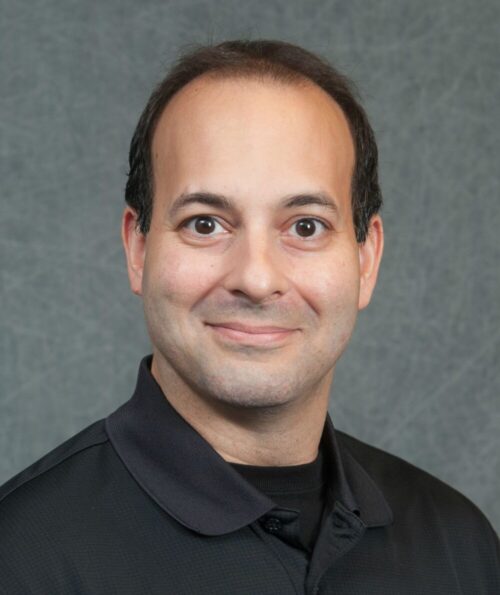
CFM Lunch Seminar

Thursday, September 12, 2024
CFM will meet in Olin 105 with lunch service at 12pm and the seminar at 12:30 pm.
Speaker:
Professor Reza Ghiladi from NC State University Department of Chemistry.
Title:
“Photodynamic and pH-Dynamic Materials: Improving the Toolbox to Overcome Challenges in Infection Prevention”
Abstract:
Efforts to control hospital acquired infections (HAIs) have been hampered by the emergence of drug-resistant pathogens, necessitating the pursuit of advanced functional materials that are capable of the self-disinfection of such microbes in hospital environments. To that end, we have explored material utilizing two approaches for pathogen reduction: antimicrobial photodynamic inactivation (aPDI) and antimicrobial pH-dynamic inactivation (apHDI). In vitro aPDI studies were performed against bacteria and viruses employing photosensitizer-embedded or conjugated nanofibrillated cellulose, polyacrylonitrile or nylon nanofibers, dual-dyed wool/acrylic blended fibers, olefinic block copolymers, and spray coatings. For natural polymer scaffolds, cellulose-porphyrin conjugates (nanocrystals, nanofibers, or paper sheets) were found to be highly effective against a broad spectrum of pathogens: our best results demonstrated that S. aureus, A. baumannii, P. aeruginosa and K. pneumoniae all exhibited photodynamic inactivation by 99.99+%, as well as inactivation of dengue-1 virus (>99.995%), influenza A (~99.5%), and human adenovirus-5 (~99%). As an alternative strategy, non-covalent approaches to photodynamic materials using artificial polymers were also explored: i) using electrospinning, cationic porphyrin and BODIPY photosensitizers were embedded into polyacrylonitrile and nylon nanofibers, and the resultant nonwoven materials possessed both antibacterial and antiviral activities; ii) using melt-pressing, we developed a photosensitizer-embedded olefinic block copolymer that exhibited excellent antimicrobial properties against a range of microbes, including Gram-positive and Gram-negative drug-resistant bacteria, as well as against enveloped and non-enveloped viruses; and iii) more recently, we have explored photodynamic coatings on polymer microfibers for pathogen inactivation, and have demonstrated population reductions of >99.9999 and 99.6% for S. aureus and antibiotic-resistant E. coli, respectively, after exposure to visible light for 1 h. In response to the current COVID-19 pandemic, we also confirmed that these coated fibers can inactivate a human common cold coronavirus serving as a surrogate for the SARS-CoV-2 virus. In a non-photodynamic approach, excellent antimicrobial properties were achieved through the use of charged multiblock polymers wherein the midblock was selectively sulfonated: the resultant hydrophilic and water-swellable “pH-dynamic” polymers led to self-sterilizing surfaces that rapidly act (killing more than 99.9999% in just 5 min) against a wide range of Gram-positive and -negative bacteria, as well as enveloped and non-enveloped viruses. Together, these results demonstrate that such materials may have widespread applicability for non-specific pathogen disinfection, and further research may lead to their application in hospitals and healthcare-related industries where novel materials with the capability of reducing the rates of transmission of a wide range of bacteria, viruses, and fungi, particularly of antibiotic resistant strains, are desired.
Bio:
Reza A. Ghiladi received a B.S. in Chemistry from Haverford College in 1995, followed by advanced training in synthetic inorganic chemistry with Prof. Ken Karlin at Johns Hopkins University, earning an M.A. in 1997 and a Ph.D. in 2001. Following postdoctoral work at the Mayo Clinic under Prof. Frank Rusnak as the Kendall-Mayo Fellow in Biochemistry, he continued his training as a National Institutes of Health Postdoctoral Fellow at the University of California at San Francisco under Prof. Paul Ortiz de Montellano. Prof. Ghiladi joined the Department of Chemistry at North Carolina State University in 2006 as an Assistant Professor, and his research has focused on both antimicrobial materials for infection control as well as mechanistic enzymology. In 2012, he was the recipient of a National Science Foundation CAREER Award, in 2013 he received the LeRoy and Elva Martin Award for Teaching Excellence from the NC State College of Sciences, in 2016 he received the university-wide NC State University Outstanding Teacher Award, and he was named a University Faculty Scholar in 2019. In 2018, he co-founded PhotoCide Protection Inc., a university startup company focused on commercializing photodynamic antimicrobial materials. Prof. Ghiladi was appointed as the Director of Graduate Programs for the Department of Chemistry in 2020, and currently holds the rank of Professor.
